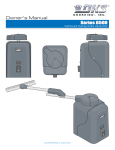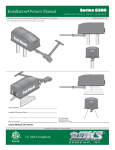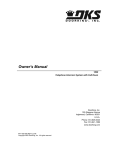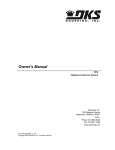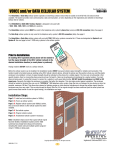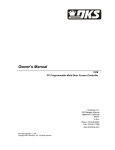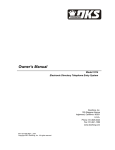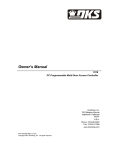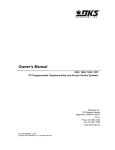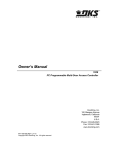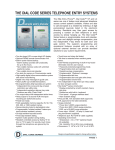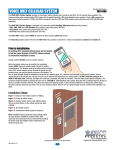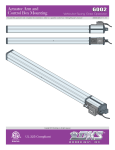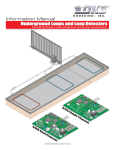Download Elevator Control
Transcript
Owner’s Manual Model 2348 Elevator Control Boards DoorKing, Inc. 120 Glasgow Avenue Inglewood, California 90301 U.S.A. Phone: 310-645-0023 Fax: 310-641-1586 www.doorking.com P/N 2348-065 REV E, 10/11 Copyright 2001 DoorKing, Inc. All rights reserved. Page 2 2348-065-E-10-11 Use this manual with the following models only. Elevator Control boards 2348-010 Rev A or higher. DoorKing, Inc. reserves the right to make changes in the products described in this manual without notice and without obligation of DoorKing, Inc. to notify any persons of any such revisions or changes. Additionally, DoorKing, Inc. makes no representations or warranties with respect to this manual. This manual is copyrighted, all rights reserved. No portion of this manual may be copied, reproduced, translated, or reduced to any electronic medium without prior written consent from DoorKing, Inc. Wiring charts on pages 38-51 may be copied as necessary. 2348-065-E-10-11 Page 3 Page 4 2348-065-E-10-11 Table of Contents Section 1 – Introduction 1.1 1.2 1.3 General Information..................................................................................................................................7 Visitor Elevator Control 1.2.1 Lobby Hall Up Call On..............................................................................................................8 1.2.2 Lobby Hall Up Call Off..............................................................................................................8 Resident Elevator Control ........................................................................................................................9 1.3.1 1.4 Programming Resident Floor Control Relay Time ...................................................................9 System Requirements ..............................................................................................................................10 Section 2 –Control Cabinet Installation General Information ..................................................................................................................................................11 2.1 Large Housing ..........................................................................................................................................12 2.2 Small Housing ..........................................................................................................................................13 Section 3 – Set-up Information 3.1 Block Diagram ..........................................................................................................................................15 3.2 Board Set-up ............................................................................................................................................16 3.3 3.2.1 Elevator Shaft Identification .....................................................................................................16 3.2.2 Floor Identification ....................................................................................................................16 3.2.3 Relay Settings ..........................................................................................................................17 3.2.4 Lobby Hall Up Call Relay .........................................................................................................17 Switch Settings & Description ..................................................................................................................18 Section 4 – Wiring Information 4.1 General Information..................................................................................................................................19 4.2 Control Board Terminal Identification .......................................................................................................20 4.3 Power Wiring Block Diagram....................................................................................................................22 4.4 Control Wiring 4.4.1 Wiegand Wiring ........................................................................................................................23 4.4.2 Floor Control Relay Wiring .......................................................................................................23 4.4.3 Lobby Hall Up Call Relay .........................................................................................................24 4.4.4 Ground Floor Detect Switch .....................................................................................................24 4.4.5 Resident Access Device ..........................................................................................................24 Wiring Diagram .........................................................................................................................................................25 Detail Wiring Diagram...............................................................................................................................................26 Section 5 – Elevator Control Common Oversights .................................................................................................................................................27 Software Programming .............................................................................................................................................28 Section 6 – Trouble Shooting 6.1 6.2 6.3 General Trouble Shooting ........................................................................................................................35 Programming Trouble Shooting Aids 6.2.1 Automatic Test #1 ....................................................................................................................36 6.2.2 Manual Test # 2 .......................................................................................................................36 Appendix...................................................................................................................................................37 Relay Wiring Identification Sheets............................................................................................................38 2348-065-E-10-11 Page 5 Page 6 2348-065-E-10-11 Section 1 – Introduction DoorKing's Model 2348-010 Elevator Control System provides complete elevator security and is used to (1) restrict which floors visitors may have access to via the elevator(s) after they have been granted access by a building resident, and (2) restrict which floors residents may have access to via the elevator(s). Elevator control is typically used in high rise apartment building applications that are equipped with this option and a DoorKing Model 1833, 1835 or 1837 Telephone Entry System, or the DoorKing Model 1838 Multi-door Access Control System. This system also requires the installation of an access device (card reader) in the elevator car to enable building residents to activate the floor buttons according to the security level assigned to them. 1.1 General Information Up to eight (8) elevators may be controlled by up to eight (8) DoorKing Access Control Systems (1833, 1835, 1837, 1838) at four (4) entrances. Typically, a telephone entry system is installed at the building entrance. The 2348-010 elevator control board(s) is located and installed close to the elevator electronic control panel. A three conductor wire connects the 2348-010 board to the telephone entry system. Resident access to different floors in the building is controlled by an access device (card reader) installed in the elevator car and connected to the telephone entry system (or to a Tracker expansion board) by routing the wiring along with the elevator car electrical umbilical cable. The elevator control system is able to restrict elevator button operation by interrupting the button wiring between the elevator car and the elevator control electronics. The elevator car floor button wiring is routed through the relays on the elevator control board before being connected to the elevator electronics. In this manner, the 2348-010 elevator control system may either open or close the wiring to the floor buttons in the elevator car upon command, and thus either disable or enable the desired floor button(s) for a programmed period of time. Elevator Control Block Diagram Elevator Shaft 1 Elevator Shaft 2 Elevator Shaft 3 Elevator Shaft 4 Elevator Shaft 5 Elevator Shaft 6 Elevator Shaft 7 Elevator Shaft 8 Relays 49-64 Relays 49-64 Relays 49-64 Relays 49-64 Relays 49-64 Relays 49-64 Relays 49-64 Relays 49-64 Relays 33-48 Relays 33-48 Relays 33-48 Relays 33-48 Relays 33-48 Relays 33-48 Relays 33-48 Relays 33-48 Relays 17-32 Relays 17-32 Relays 17-32 Relays 17-32 Relays 17-32 Relays 17-32 Relays 17-32 Relays 17-32 3 PWR MASTER Board 1 Relays 1-16 PWR MASTER Board 1 Relays 1-16 PWR MASTER Board 1 Relays 1-16 PWR MASTER Board 1 Relays 1-16 PWR MASTER Board 1 Relays 1-16 PWR MASTER Board 1 Relays 1-16 PWR MASTER Board 1 Relays 1-16 PWR MASTER Board 1 Relays 1-16 2 3 3 3 3 3 3 3 3 1 3 1833, 1835, 1837, 1838 Access Control System 1 3 conductor, stranded with overall shield, 18, 20, 22 or 24 gauge is sufficient for these connections. 2 16 VAC Power. One transformer for each four (4) Elevator Boards. 3 Supplied ribbon cable. DOORKING, INC., INGLEWOOD, CA 90301 Title: Date: Elevator Control Block Diagram 10/11 Dwg. No. M2348-065-1 Rev. C Figure 1 2348-065-E-10-11 Page 7 1.2 Visitor Elevator Control When a visitor calls a resident via the telephone entry system and the resident grants the visitor access, data is sent from the telephone entry system to the 2348-010 elevator control board. Upon receiving this data, the elevator control board will respond in two different manners depending on the setting of SW2, switch 8. 1.2.1 Lobby Hall Call On If SW2, switch 8 is in the OFF position, a "Lobby Hall Up Call" relay on the elevator control board will activate and call the elevator to go to the lobby or ground floor. This is accomplished by wiring the output of the lobby call relay in parallel to the ground floor button in the elevator electronics panel. Once the elevator reaches the ground floor, a ground floor detect switch must signal the 2348-010 board that the elevator has arrived. This signal is in the form of a switch closure across terminals 17 and 18 and may be available from existing hardware in the elevator electronics panel. Once the 2348-010 board receives this elevator detect signal, the floor button that the resident who granted the visitor access resides on, will become "live" for a period of time that has been set in the DoorKing Remote Account Manager software. Only this floor button will work when the visitor enters the elevator. Using the lobby hall call feature is desirable in that the timer for the floor button does not become active until the elevator reaches the lobby or ground floor. For example, if the timer was set in the software to activate the floor button for one minute, the one minute timer will not start until the elevator car reaches the ground floor. This would assure that there is ample time for the visitor to walk to the elevator and press the respective floor button. 1.2.2 Lobby Hall Call Off If SW2, switch 8 is in the ON position, the "Lobby Hall Up Call" relay on the 2348-010 board does not operate. When the visitor is granted access, the floor button that the resident who granted the visitor access resides on immediately becomes "live" for the period of time that has been programmed in the software. In this mode, the 2348-010 board does not call the elevator to the lobby or ground floor. This would require the visitor to press the elevator call button in the lobby to call the elevator to the ground floor. It is important to note that if the 2348-010 control board is used in this manner, the floor button in the elevator car becomes "live" immediately after the visitor is granted access and the time period that the button is "live" begins immediately. Because of this, the time period that the button is "live" must be set for an adequate amount of time to allow the elevator to reach the ground floor from the highest floor, and allow the visitor time to walk to the elevator. This time is set in the DoorKing Remote Account Manager software. Page 8 2348-065-E-10-11 1.3 Resident Elevator Control When elevator control is in use, an access device such as a card reader must be installed in the elevator car to allow residents access to the floors in the building. Residents can be restricted to certain floors, or allowed access to all floors. These restrictions are dependent on the security level assigned to the resident and are programmed in the DoorKing Remote Account Manager software. When a resident enters the elevator car, they insert their access card into the card reader. This is necessary because the floor buttons in the elevator remain "dead" until a command is received by the 2348-010 board to turn them on. Depending on the security level assigned to them, the floor button(s) in the elevator car will become "live.” The time interval that the button(s) is “live” is dependant on the revision level of the 1830 series telephone entry/access controller circuit board, not the 2348 elevator control board. Refer to the table below. Controller Circuit Board Revision Level Time Interval 1833 1835 A-E 7 Seconds 1837 1833 1835 F - Higher Programmable from 1 to 254 seconds 1837 1838 A-C 1838 D - Higher 7 Seconds Programmable from 1 to 254 seconds Table 1 1.3.1 Programming Resident Floor Control Relay Time The following programming sequence can only be performed at the telephone entry / access system controller keypad. The resident elevator button relay time interval cannot be programmed via the Remote Account Manager software. The maximum time that can be entered is 254 seconds. Factory setting = 007 1. Press * 3 6 and then enter the four digit master code _ _ _ _ (beep). The display on the 1835 and 1837 systems will read: RES ELE TIME xxx SEC 2. Enter the relay time in seconds (001 – 254) _ _ _ then press * (beep). 3. Press 0 # together to end this programming sequence (beeeeeep). 2348-065-E-10-11 Page 9 1.4 System Requirements The maximum number of elevator control systems that can be controlled from a DoorKing access control system (1833, 1835, 1837, 1838) is eight. That is eight elevator cars (shafts) with each car serving up to 64 floors. Each 2348-010 elevator control board can control up to 16 floors in a single shaft, therefore a single elevator serving 64 floors requires the use of four (4) 2348-010 boards. If two elevator cars (shafts) need to be controlled, with each car serving 32 floors, a total of four (4) 2348-010 boards would be required - two for each elevator car (shaft). The table below determines the number of 2348-010 boards required to control the elevator system, depending on the number of cars (shafts) and floors that are to be serviced. Elevator Shafts Floors Car 1 Car 2 Car 3 Car 4 Car 5 Car 6 Car 7 Car 8 1-16 1 2 3 4 5 6 7 8 17-32 2 4 6 8 10 12 14 16 33-48 3 6 9 12 15 18 21 24 49-64 4 8 12 16 20 24 28 32 Table 2 The 2348-010 boards are housed in either a small (1816-102) or large (1816-100) cabinet. The small cabinet will hold two 2348-010 boards, while the large cabinet will hold up to four boards. Each elevator shaft requires either a small or large cabinet depending on the number of 2348 boards that are required for the shaft. The DoorKing elevator control system can only be used with a DoorKing model 1833, 1835 or 1837 telephone entry system, or with the DoorKing model 1838 multi-door access control system. A card reader (or other access device) must be installed in the elevator car to allow building residents access to floors as defined within the security level assigned to them. The system must be programmed with a PC using the DoorKing Remote Account Manager for Windows software, version 5.0 or later. Tracker expansion boards may be required depending on the number of doors and elevator cars being controlled by the system. Page 10 2348-065-E-10-11 Section 2 - Control Cabinet Installation Installation of the 2348-010 elevator control board(s) and cabinet(s) should be coordinated with the elevator service company. The cabinets should be installed in close proximity to the elevator electronic control panel so that wiring between the elevator electronic control panel and the 2348-010 board(s) is simplified. 110 VAC power must be available nearby to power the transformer(s) that will supply 16 VAC power to the 2348-010 board(s). One 16 VAC power transformer is required for each elevator car (shaft) controlled. 1. Open the cabinet and remove any ribbon cables from the 2348-010 board (systems with two or more boards only). 2. Remove the four screws from each corner of the board and then remove the board from the cabinet. CAUTION: Touch a proper ground with your hands before removing the board(s) from the cabinet. This will discharge any static electricity and prevent electrostatic discharge damage to the board. 3. Mount the cabinets. Each cabinet has four mounting holes located in the corners. Be sure that the mounting screws do not protrude into the cabinet in such a way that they can cause a short to the back of the 2348-010 board. 4. Make any conduit connections at this time. 5. Clean out the cabinet being sure that any metal shavings are removed from the cabinet. 6. Re-install the 2348-010 board(s) and the ribbon cables. 2348-065-E-10-11 Page 11 2.1 Large Housing FOUR BOARD ENCLOSURE .875 4.125 35 35.25 .875 10.25 .675 4.0 12.375 2.5 2.0 1.625 .875 DIA 2 PL 2.0 4.625 12 DOORKING, INC., INGLEWOOD, CA 90301 Title: Date: Quad Enclosure for 2348-010 Board P/N 2348-081 10/03 Dwg. No. M2348-065-2 Rev. A Figure 2 Page 12 2348-065-E-10-11 2.2 Small Housing TWO BOARD ENCLOSURE 4.125 .875 21 21.25 .875 10.25 .675 4.0 12.375 2.5 2.0 1.625 .875 DIA 2 PL 2.0 4.625 12 DOORKING, INC., INGLEWOOD, CA 90301 Title: Date: Dual Enclosure for 2348-010 Board P/N 2348-080 10/03 Dwg. No. M2348-065-3 Rev. A Figure 3 2348-065-E-10-11 Page 13 Page 14 2348-065-E-10-11 Section 3 – Set-up Information This chapter will describe how to set-up the 2348-010 elevator control board for different modes of operation, and how to identify each board and which elevator and floors the board is controlling to the access system. This is determined by the switch settings of SW1 (top) and SW2 (bottom) on each of the 2348-010 boards. The floor relays on the board can be set to operate as either normally closed or normally open devices by placement of the relay jumpers on either the N.O. or N.C. pins next to the corresponding relay. 3.1 Block Diagram Each elevator control board has 16 floor relays. One elevator shaft can consist of four (4) 2348-010 elevator boards to control up to 64 floors (16 x 4). The elevator boards are connected to each other via a ribbon cable. The elevator board that is connected directly to the access system is designated as the MASTER board - therefore each MASTER board can have up to three (3) additional 2348-010 boards connected to it via the ribbon cable. Each access system (1833, 1835, 1837, 1838) can have up to eight (8) MASTER 2348-010 boards connected to it, with each master controlling an additional three (3) boards. Therefore, the access system can accommodate up to eight (8) elevator shafts with each shaft accommodating up to 64 floors. Elevator Control Block Diagram PWR Elevator Shaft 1 Elevator Shaft 2 Elevator Shaft 3 Elevator Shaft 4 Elevator Shaft 5 Elevator Shaft 6 Elevator Shaft 7 Elevator Shaft 8 Relays 49-64 Relays 49-64 Relays 49-64 Relays 49-64 Relays 49-64 Relays 49-64 Relays 49-64 Relays 49-64 Relays 33-48 Relays 33-48 Relays 33-48 Relays 33-48 Relays 33-48 Relays 33-48 Relays 33-48 Relays 33-48 Relays 17-32 Relays 17-32 Relays 17-32 Relays 17-32 Relays 17-32 Relays 17-32 Relays 17-32 Relays 17-32 MASTER Board 1 Relays 1-16 MASTER Board 1 Relays 1-16 MASTER Board 1 Relays 1-16 MASTER Board 1 Relays 1-16 MASTER Board 1 Relays 1-16 MASTER Board 1 Relays 1-16 MASTER Board 1 Relays 1-16 MASTER Board 1 Relays 1-16 3 PWR 3 PWR 3 PWR PWR 3 3 PWR PWR 3 PWR 3 3 3 1833, 1835, 1837, 1838 Access Control System DOORKING, INC., INGLEWOOD, CA 90301 Title: Date: Elevator Control Block Diagram 12/07 Dwg. No. M2348-065-4 Rev. B Figure 4 2348-065-E-10-11 Page 15 3.2 Board Set-up The 2348-010 elevator boards must be set to identify to the access control system which elevator shaft that it is in, and which floors in the elevator shaft that it is controlling. This programming function is accomplished by the two DIP switches on the elevator control board, with each DIP switch having eight (8) switches in them. The top switch is designated as SW-1 and the bottom switch is designated as SW-2. NOTE: Switches 4-7 on SW-1 and switches 3-7 on SW-2 are spares and are not used. Leave these switches in the OFF position. 3.2.1 Elevator Shaft Identification Each MASTER board must be set to identify which elevator shaft that it is controlling (shaft 1, 2, 3, 4, 5, 6, 7 or 8). The shaft setting is set by switch SW-1, switches 1, 2 and 3 (Table 3). The MASTER board is the board that has 16 VAC power connected to it and is connected to the access control system elevator terminals and receives weigand data from the access control system. There can only be one MASTER board per shaft. If there is more than one MASTER board in the system (two or more elevator shafts), it is very important that these switches be set correctly. NOTE: SW-1, switches 1, 2 and 3, apply only to the MASTER board. These switches are not relevant to other 2348-010 boards connected to the MASTER board via the ribbon cable and can be left in the OFF position. Master Board Identification SW-1 Switch Settings Elevator Shaft Number SW-1 1 2 3 4 5 6 7 8 Switch 1 OFF ON OFF ON OFF ON OFF ON Switch 2 OFF OFF ON ON OFF OFF ON ON Switch 3 OFF OFF OFF OFF ON ON ON ON Table 3 3.2.2 Floor Identification Each of the 2348-010 elevator control boards connected to the system must be set to identify which floors that the board will control in the shaft that it is in. The floor setting is set by switch SW-2, switches 1 and 2 (Table 4.). Floor Identification SW-2 Switch Settings Floors SW-2 1-16 17-32 33-48 49-64 Switch 1 OFF ON OFF ON Switch 2 OFF OFF ON ON Table 4 Page 16 2348-065-E-10-11 3.2.3 Floor Control Relay Settings Each of the 16 floor control relays on the 2348-010 elevator control board can be set to operate as either a normally open (N.O.) or normally closed (N.C.) device. This is accomplished by the shorting pins located next to each of the relays. SW-1 switch 8 also affects these 16 relays and how they operate. If SW-1 switch 8 is in the OFF position, the 16 elevator button relays on the board will not energize when power is applied to the board. If SW-1 switch 8 is in the ON position, the 16 elevator button relays on the board will energize when power is applied to the board. NOTE: The setting of SW-1 switch 8 does not affect the LOBBY HALL UP CALL relay. Refer to 3.2.4 for more information on the CALL relay. The normal (and recommended) settings for the 16 floor control relays is N.C. (normally closed). This provides normal elevator button operation should the 2348-010 board(s) lose power or become disabled by any other means. Likewise, the normal (and recommended) setting for SW-1 switch 8 is ON so that when the 2348-010 board powers up, all 16 elevator button relays on the board will energize and thus result in an open output circuit since the relays are set for N.C. operation. If the relays are set for normally open (N.O.) operation and the 2348 board loses power or becomes disabled by any other means, the floor buttons in the elevator will work. 3.2.4 Lobby Hall Up Call Relay The LOBBY HALL UP CALL relay is a special relay on the 2348-010 elevator control board that can be programmed to "call" the elevator to the lobby or ground floor when a visitor is granted access by the access control system. Only the LOBBY HALL CALL relay on the system MASTER board(s) activates when access is granted. The LOBBY HALL CALL relay feature is turned on or off by SW-2 switch 8, and like the other relays on the 2348-010 board it can be set to operate as either a normally open (N.O.) or normally closed (N.C.) device. The normal setting for the LOBBY HALL CALL relay is N.O. If SW-2 switch 8 is in the ON position, the LOBBY HALL CALL relay WILL NOT activate when access has been granted. If SW-2 switch 8 is in the OFF position, the LOBBY HALL CALL relay WILL activate when access is granted and will cause the elevator car to go to the lobby (or whatever floor the call relay has been wired to) floor. The setting of SW-2 switch 8 also affects the start of the time allowed for the floor control relays to be active. When this switch is in the ON position, the time that the floor control relay(s) activates begins immediately after access has been granted. If the switch is in the OFF position, the time begins only after the ground floor detect input is activated on the 2348010 board. Careful thought should be given to this function. If the switch is in the ON position (lobby hall call feature is turned off), the time setting in the software must be set high enough to allow the elevator to reach the first floor from the top floor, and allowance must also be made for the time it takes a visitor to reach the elevator after they have entered the building. For example, if the time in the software was set to 30 seconds, but it takes the elevator 45 seconds to reach the first floor from the top floor, the amount of time that the floor control relay is active will have expired by time the elevator reached the first floor. The visitor will find that the buttons in the elevator are inoperative. When SW-2 switch 8 is in the OFF position (lobby hall call feature is turned on), the time that the floor control relay(s) are turned on begins when the ground floor detect input on the 2348-010 board is activated. Note that if lobby hall call is used, a ground floor detect input must be received by the 2348-010 board, otherwise the floor control button(s) will never become active. For information on programming the amount of time that the floor control relays are turned on, refer to the Remote Account Manager User's Manual (P/N 1835-066). 2348-065-E-10-11 Page 17 3.3 Switch Settings & Description SW 1 (TOP SWITCH) SWITCH FUNCTION SETTING DESCRIPTION 1–2-3 Elevator Shaft Identification 4 thru 7 Spare OFF Spare switches. Leave in OFF position 8 Relay Activation OFF Floor control relays WILL NOT energize when power is applied to the board. ON Floor control relays WILL energize when power is applied to the board. Identifies which elevator shaft the MASTER board is controlling. See table 3, page 16 for switch matrix. Refer to section 3.2.1 for detailed information. Switches 1-2-3: These switches identify which elevator shaft the 2348 circuit board is controlling. Refer to the switch matrix (table 3) on page 16 for switch settings to identify elevator shafts 1 – 8. Switches 4–7: Spare switches. Leave in the OFF position. Switch 8: This switch sets the floor control relays to either energize or not energize when power is applied to the circuit board. This switch setting is used in conjunction with the N.O. (Normally Open) and N.C. (Normally Closed) relay setting on the circuit board. Refer to section 3.2.3 for more information. SW 2 (BOTTOM SWITCH) SWITCH FUNCTION 1–2 Floor Identification SETTING DESCRIPTION 3 thru 7 Spare OFF Spare switches. Leave in OFF position 8 Lobby Hall Call Relay OFF Lobby Hall Call relay activates when visitor access is granted. Ground floor detect input must be used if this switch is in the OFF position. ON Lobby Hall Call relay not used. Identifies which floors the elevator board is controlling. See table 4, page 16. Switches 1–2: These switches identify which floors the elevator board is controlling. Refer to the switch matrix (table 4) on page 16 for switch settings to identify floors controlled. Switches 3-7: Spare switches. Leave in the OFF position. Switch 8: This switch should be in the OFF position if the Lobby Hall Up Call relay is used to call the elevator car to the lobby (or ground) level when visitor access is granted. The ground floor detect input must be used when this switch is in the OFF position. Floor control relay activation timing starts when the ground floor detect input is activated. If the Lobby Hall Up Call relay is not used, this switch must be in the ON position. Floor control relay activation timing starts when visitor access is granted. Refer to section 3.2.4 for more information. Page 18 2348-065-E-10-11 Section 4 – Wiring Information Prior to installing wiring to the elevator control board(s), we suggest that you become familiar with the instructions, illustrations, and wiring guidelines in this manual. This will help insure that your installation is performed in an efficient and professional manner. The wiring of the elevator control board(s) is an extremely important and integral part of the overall access control system. Use proper wire for the weigand lines, power wires, and be sure that the system is properly grounded. Check all local building ordinances and building codes prior to installing this system. Be sure your installation is in compliance with local codes. Wiring of this system will have to be coordinated with the elevator service company. Only qualified elevator service personnel should interface the elevator button relays with the elevator electronic control panel. 4.1 General Information Use only the supplied 16 VAC, 40 VA transformer (or U.L. listed equivalent) to power the elevator control board. One (1) elevator control cabinet (max 4 boards) can be powered from a single transformer. Do not power any other devices (electric strikes, magnetic locks, etc.) from these power transformers. For wire runs up to 100 feet, use 18 AWG, 600 volt insulated wire. For wire runs up to 200 feet, use 16 AWG, 600 volt insulated wire. Power wires are susceptible to noise and hum pickup; therefore it is preferable that you keep power wire runs as short as possible. The 2348-010 elevator control board contains a number of static sensitive components that can be damaged or destroyed by static discharges during installation or use. Discharge any static prior to removing any circuit board from the cabinet by touching a proper ground device. Proper grounding of this system is a requirement. The use of surge suppressers can significantly reduce the chance of component failure because of static charges or surges. To be effective, ground connections should be made with a minimum 12 AWG, 600 volt insulated wire to a ground point within 10 feet of the system. The ground point must be at an electrical panel, a metallic cold water pipe that runs in the earth, or a stainless steel grounding rod driven at least ten (10) feet into the soil. If there are several elevator boards and other components in the access control system in close proximity to each other, you should consider using a single point ground. Check with your building department for specific grounding guidelines as soil conditions and grounding requirements differ depending on your geographical location. Use low voltage (P/N 1878-010) surge suppressers on low voltage power runs to help protect equipment from damage because of power spikes and surges. Use DoorKing surge suppressers or equivalent. All wires should be placed in conduits. Proper pre-planning can greatly ease the installation and wiring of this system. Always check with the local building code to determine the type of wire required in your municipality. 2348-065-E-10-11 Page 19 4.2 Control Board Terminal Identification Relay Shorting Pins Terminals 1-18 Terminals 37-54 Power 1 2 3 4 5 6 7 8 Terminals 19-36 1 2 3 4 5 6 7 8 SW 1 Terminals 55-72 SW 2 DOORKING, INC., INGLEWOOD, CA 90301 Title: Date: 2348-010 Control Board 11/03 Dwg. No. M2348-065-5 Rev. A Figure 5 Page 20 2348-065-E-10-11 Left Terminals Right Terminals 1 37 2 38 3 39 4 40 5 41 6 42 7 43 8 Not Used 9 44 45 10 46 11 47 12 48 13 49 14 50 15 51 16 52 17 Ground Floor Detect Input 18 19 Not Used 53 54 55 20 Data 1 – Wiegand Input 1 56 21 Data 0 – Wiegand Input 1 57 22 Common – Wiegand Input 1 58 23 Data 1 – Wiegand Input 2 59 24 Data 0 – Wiegand Input 2 60 25 Common – Wiegand Input 2 61 26 62 27 63 28 64 29 30 Not Used 65 66 31 67 32 68 33 69 34 35 36 2348-065-E-10-11 Earth Ground 16 VAC Input 70 71 72 Relay 16 Relay 15 Relay 14 Relay 13 Relay 12 Relay 11 Relay 10 Relay 9 Relay 8 Relay 7 Relay 6 Relay 5 Relay 4 Relay 3 Relay 2 Relay 1 Lobby Hall Up Call Relay Not Used Page 21 4.3 Power Wiring Block Diagram The elevator control boards must be supplied with 16 VAC power and be properly grounded. Each elevator cabinet can be powered from a single transformer. • Use 18 AWG 600 volt insulted wire for power runs up to 100 feet and 16 AWG 600 volt insulated wire for power runs up to 200 feet. Try to keep all power wire runs as short as possible. • Use a minimum 12 AWG wire for ground. • Because local building codes vary from city to city, we urge you to check with the local building department to determine the type of wire required for all wiring applications. Be sure to color code all wires. If multiple transformers are required to power several elevator control cabinets, consider using the DoorKing model 1200 Transformer Box (P/N 1200-080). This ETL listed box provides a lockable enclosure that can house up to four (4) transformers to meet your power requirements. Cabinet 1 (Shaft 1) Cabinet 2 (Shaft 2) Cabinet 3 (Shaft 3) Cabinet 4 (Shaft 4) Cabinet 5 (Shaft 5) Cabinet 6 (Shaft 6) Cabinet 7 (Shaft 7) Cabinet 8 (Shaft 8) Board 4 Relays 49-64 Board 4 Relays 49-64 Board 4 Relays 49-64 Board 4 Relays 49-64 Board 4 Relays 49-64 Board 4 Relays 49-64 Board 4 Relays 49-64 Board 4 Relays 49-64 Board 3 Relays 33-48 Board 3 Relays 33-48 Board 3 Relays 33-48 Board 3 Relays 33-48 Board 3 Relays 33-48 Board 3 Relays 33-48 Board 3 Relays 33-48 Board 3 Relays 33-48 Board 2 Relays 17-32 Board 2 Relays 17-32 Board 2 Relays 17-32 Board 2 Relays 17-32 Board 2 Relays 17-32 Board 2 Relays 17-32 Board 2 Relays 17-32 Board 2 Relays 17-32 Board 1 Relays 1-16 Board 1 Relays 1-16 Board 1 Relays 1-16 Board 1 Relays 1-16 Board 1 Relays 1-16 Board 1 Relays 1-16 Board 1 Relays 1-16 Board 1 Relays 1-16 Transformer Box P/N 1200-080 Transformer Box P/N 1200-080 115 VAC 115 VAC Figure 6 Page 22 2348-065-E-10-11 4.4 Control Wiring Use the figures on the next two pages to assist you with wire connections to the 2348 Elevator Control Board. 4.4.1 Wiegand Wiring Up to eight (8) MASTER 2348-010 elevator control boards can be connected to a single access control system. Each MASTER board can have an additional three (3) elevator control boards connected to it for control of up to 64 floors (16 floor relays on each board). There are two wiegand inputs to the 2348-010 elevator control board. Each wiegand input can have two (2) access control systems connected to it. In this manner, a maximum of four (4) access control systems can be connected to the board for elevator control. • Maximum wiegand wire run is 500 feet. • Use 4 conductor stranded with overall shield, 18, 20, 22 or 24 gauge wire. • Float the shield at the elevator board. Do not connect the shield to elevator board common. • Do not use twisted pair with wiegand output format. 4.4.2 Floor Control Relay Wiring Interconnecting the floor control relay wiring from the 2348-010 elevator board with the elevator control panel should be performed by a qualified elevator service technician only. We recommend that all functions of the elevator control board be tested prior to wiring the floor control relays to the elevator electronic control panel. For safety reasons, the preferred method of operation is for the floor control relays to be set for N.C. operation. The diagrams on the next pages assume this method of operation. • Be sure that the relays on the 2348-010 control board are set for normally closed (N.C.) operation. The shorting bars next to the relays should be on the NC pins for each relay. • Be sure that SW1, switch 8 is in the ON position (refer to section 3.2.3). • Route wiring from the 2348-010 cabinet(s) to the elevator control panel (Fig 7, 8). Be sure to color code and mark all wiring! • The relay contacts on the 2348-010 elevator control board are rated for 1 amp at 125 VAC. Use 18 AWG 600 volt insulated wire (or better) for relay wiring, or use wiring as specified by the elevator service-company or local code. • Jumper all floor control relay common terminals together to provide a single common wire for floor control. • A separate floor control relay contact is provided to the elevator control system for each floor. • Use the charts in the back of this manual to list all connections made and which relays interface with which floor buttons in the elevator car. 2348-065-E-10-11 Page 23 4.4.3 Lobby Hall Up Call Relay The Lobby Hall Up Call Relay (terminals 69-70) is a special relay that activates when access has been granted and "calls" the elevator car to the lobby or ground floor. • Be sure that the lobby hall call relay is set for Normally Open (N.O.) operation. • SW-2, switch 8 must be in the OFF position for the LOBBY HALL CALL function to operate. NOTE: If the LOBBY HALL CALL relay function is used (SW-2, switch 8 OFF), then the elevator detect switch must be connected to the 2348-010 control board (see 3.2.4). 4.4.4 Ground Floor Detect Switch The ground floor detect switch signals the 2348-010 elevator control board that the elevator car has arrived at the lobby or ground floor. This signal is in the form of a switch closure across terminals 17 and 18 and may be available from existing hardware in the elevator electronics panel. Consult with the elevator service technician regarding this switch input. • Connect a Normally Open (N.O.) ground floor detect switch to terminals 17 and 18 (fig 7). • Note: Dry contact - no voltage. • The switch must activate when the elevator car is at the lobby or ground floor. 4.4.5 Resident Elevator Access Device Each elevator car that is controlled by the access system must have an access device (card reader, keypad, etc.) installed in the elevator car so that the access system knows which floor(s) the resident is to be granted access to. • Installing the access device in the elevator car should be coordinated with the elevator service company since wiring from the access device inside the elevator car will have to be routed along the elevator electrical umbilical cable to the access controller. • Refer to the access control system installation manual for additional wiring instructions. • Route the wiring from the access device to the access control system via the elevator electrical umbilical (fig. 8). • Connect this wiring as specified in the access control system installation manual. There is no direct connection of the access device to the 2348-010 Elevator Control Board. Page 24 2348-065-E-10-11 Elevator 1 Elevator 2 2348-010 Board 4 Relays 49-64 2348-010 Board 4 Relays 49-64 7 7 2348-010 Board 3 Relays 33-48 2348-010 Board 3 Relays 33-48 7 7 Elevator Control Electrical Panel 2348-010 Board 2 Relays 17-32 6 1 2 3 4 5 6 7 8 9 10 11 12 13 14 15 16 17 18 1833, 1835, 1837, 1838 Elevator Terminals 2 1 2 3 6 7 WHT GRN BLK WHT GRN BLK 7 8 37 38 39 40 41 42 43 44 45 46 47 48 49 50 51 52 53 54 1 2 3 4 5 6 7 8 9 10 11 12 13 14 15 16 17 18 Relay 16 Relay 15 Relay 14 Relay 13 Relay 12 Relay 11 Relay 10 Relay 9 Relay 8 37 38 39 40 41 42 43 44 45 46 47 48 49 50 51 52 53 54 2348-010 Board 1 Relays 1-16 1 2 3 2348-010 Board 1 Relays 1-16 1833, 1835, 1837, 1838 Elevator Terminals 1 Elevator Control Electrical Panel 2348-010 Board 2 Relays 17-32 Ground Detect Switch White Green Black White Green Black 9 9 11 19 20 21 22 23 24 25 26 27 28 29 30 31 32 33 34 35 36 16 VAC PWR INPUT 4 55 56 57 58 59 60 61 62 63 64 65 66 67 68 69 70 71 72 8 Relay 16 Relay 15 Relay 14 Relay 13 Relay 12 Relay 11 Relay 10 Relay 9 Relay 8 Ground Detect Switch 3 White Green Black White Green Black Relay 7 Relay 6 Relay 5 Relay 4 Relay 3 Relay 2 Common Relay 1 Lobby Hall Up Call 19 20 21 22 23 24 25 26 27 28 29 30 31 32 33 34 35 36 16 VAC PWR INPUT 5 4 55 56 57 58 59 60 61 62 63 64 65 66 67 68 69 70 71 72 3 Relay 7 Relay 6 Relay 5 Relay 4 Relay 3 Relay 2 Common Relay 1 Lobby Hall Up Call 5 10 To Elevators 3-8 To Elevators 3-8 1 Primary access control device. DKS 1833, 1835, 1837 or 1838 only. 9 3 conductor, stranded with overall shield, 18, 20, 22 or 24 gauge is sufficient for these connections. 2 Second access control device. DKS 1833, 1834, 1835 or 1838 only. 10 Earth ground. 3 Ground floor detect switch. Must be used when Lobby Hall Up Call Relay is used. 4 Terminals 69-70. Lobby Hall Up Call. 5 16 VAC, 40 VA UL listed transformer. 6 Wiring to Elevator Control by licensed elevator control technician only. 7 Supplied Ribbon Cable between boards. 8 Floor relays are rated for 5 amp @ 125 Volt. DOORKING, INC., INGLEWOOD, CA 90301 Title: Date: Wiring - 2348 Elevator Control Board 10/11 Dwg. No. M2348-065-6 Rev. C Figure 7 2348-065-E-10-11 Page 25 Access Controller 2348-010 Elevator Control Panel 1 2 3 Elevator Car 1833, 1835, 1837, 1838 Elevator Terminals Elevator Shaft 1 2 3 1833, 1835, 1837, 1838 Controllers or Tracker Board 2348-010 Board 1 Floor Relays 1-16 WHT GRN BLK Elevator Control Panel 4 1 2 3 4 5 6 7 8 9 10 11 12 13 14 15 16 17 18 RED WHT GRN BLK 37 38 39 40 41 42 43 44 45 46 47 48 49 50 51 52 53 54 5 8 Relay 16 Floor Control Relay 15 Floor Control Relay 14 Floor Control Relay 13 Floor Control Relay 12 Floor Control Relay 11 Floor Control Relay 10 Floor Control Relay 9 Floor Control Relay 8 Floor Control Ground Detect 7 Switch 11 2 White Green Black 19 20 21 22 23 24 25 26 27 28 29 30 31 32 33 34 35 36 6 55 56 57 58 59 60 61 62 63 64 65 66 67 68 69 70 71 72 Relay 7 Floor Control Relay 6 Floor Control Relay 5 Floor Control Relay 4 Floor Control Relay 3 Floor Control Relay 2 Floor Control Relay 1 Floor Control Lobby Hall Up Call Common Elevator Car Card Reader 5 Not Used 3 10 16 VAC PWR INPUT 9 1 Elevator Umbilical Cable 9 16 VAC, 40 VA UL Listed transformer 2 4 conductor, stranded with overall shield, 18, 20, 22 or 24 gauge is sufficient for these connections. 10 Earth ground. 3 Access Device Cable Routed with Umbilical Cable 11 Dry Contact - no voltage applied 4 Floor Relays are typically set for Normally Closed (N.C.) Operation 5 Floor Relay common terminals are tied together to form a single common for floor control. 6 Terminals 69-70, Lobby Hall Up Call. 7 Ground Detect Switch must be used when Lobby Hall Up Call Relay is used. 8 Floor relays are rated for 5 amp @ 125 Volt. DOORKING, INC., INGLEWOOD, CA 90301 Title: Date: Detail Wiring - 2348 Elevator Control Board 10/11 Dwg. No. M2348-065-7 Rev. C Figure 8 Page 26 2348-065-E-10-11 Section 5 - Elevator Control 5.1 Common Oversights Floor Button Wiring - Remember that the relays for floor control start at the bottom of the board and count UP. Terminals 67 & 68 are for the first or lowest controlled floor. Terminals 65 & 66 are for the second controlled floor; terminals 63 & 64 are for the third controlled floor, etc., etc. First Floor - Remember that the Lobby Level should not be controlled or connected to the elevator control board. Look at the building and determine which floors, not counting the lobby, will require floor level control. The relay at terminals 67 & 68 may control a parking level, the 2nd floor, etc. N.O. vs N.C. Relay Setting - Elevator equipment may require either N.C or N.O connections for their floor button controls. Also, remember that this is tied in with the Fail Safe / Fail Secure setting of the system (controlled by SW1, Switch 8). • Normal Operation (Fail Safe) - SW1, Switch 8 is set in ON position. All relay jumpers should be set for N.C. operation. In this mode, all floor control relays and LED’s will activate when board is powered up. When a floor level access command is initiated, the relay and LED will deactivate, providing a contact closure, which enables the floor button. Loss of power to the elevator control board will provide a contact closure for all floor control relays. This does not affect the Lobby Hall Up Call relay. • Special Applications (Fail Secure) - SW1, Switch 8 OFF. All relay jumpers should be set for N.O. operation. In this mode, all floor control relays and LED’s will be off when the board is powered up. When a floor level access command is initiated, the relay and LED will activate, providing a contact closure, which enables the floor button. Loss of power will disable all floor buttons. This does not affect the Lobby Hall Up Call relay. Lobby Hall Up Call Function - Remember, to utilize the Lobby Hall Up Call relay, you must be provided with a Ground Floor Detect contact from the elevator equipment. If there is not a ground floor detect available, then you cannot utilize this function. • SW2, Switch 8 ON - No Lobby Hall Up Call relay activation. Visitor timing starts when visitor access is granted through the entry system. Ground floor detect is not required. • SW2, Switch 8 OFF - Ground Floor Detect contact must be provided to 2348 board to identify when elevator reaches the lobby (or ground) level. When visitor access is granted through the entry system, the LOBBY HALL UP CALL relay will activate momentarily. Visitor timing will not start until elevator reaches lobby (or ground) level. Card Reader (System Relay) Identification - This is a software programming and set up function (see software section). However, it also is related to hardware. The card reader number is determined by the wiegand port, and the tracker board jumper settings. Software Issues - Remember to program the following items within the software: • Relay/Elevator - This identifies which reader is inside which elevator. • Security Level - Security Level 01 does not provide elevator control. In Levels 02 – 30, program time zones, select relay and click on floors. • Elevator Ref - In the Resident Screen, this identifies which elevator will respond when visitor access is granted. 2348-065-E-10-11 Page 27 5.2 Software Programming When setting up the Remote Account Manager Software (refer to manual 1835-066), there are some programming steps that must be made in order for the elevator control functions to operate properly: • • • • • • On 1830 series phones - In the System Information Screen, make sure the selection is made for “1833/1835/1837/1838”. If tracker expansion boards are required - To support the reader device inside the elevator car, check the tracker box in the System Information screen. Security Level 02 or higher - You must program security levels for building tenants and residents. The default security level 01 does not provide any elevator control for building tenants! For 24-hour access to floors you must program a security level for 24 hr, 7 day access and click on all used floor locations. Select Relay and Floor(s) - Within the Security Level, you must select the relay (card reader) that is inside the elevator, and any floors that the users will be allowed to access. Relay / Elevator - You must identify which system reader is inside which elevator car. This is performed in the Relay/Elevator screen. Elevator Reference Number - In Resident Screen, this tells which elevator will respond a specific tenant when they grant access to a visitor. The following pages show these various screens and provide some quick reference information on setting up and programming the Remote Account Manager Software for elevator control functions. For further details, please refer to the Remote Account Manager Software manual (1835-066). Page 28 2348-065-E-10-11 System Information: Relay Screen Relay Screen - In the Relay Screen, you should label which “system relays” refer to the reader devices inside the elevator car(s). This is for labeling and reference only and does not affect the function or operation of the system. You MUST program the relay address at the relay/elevator screen. System Information: Security Level – Relay / Elevator Relay/Elevator screen - This addresses which system relay is inside each elevator car. This tells the system that activation of the card reader at system relay #4 is a person inside elevator #1. The system will then look at the security level programming and sends the appropriate commands up to the elevator control board. This example shows that: Relay #4 is in Elevator #1 Relay #7 is in Elevator #2 Relay #8 is in Elevator #3 2348-065-E-10-11 Page 29 System Information: Security Level Programming of Floor Button Access for building tenants is done in the Security Level Screen. Each resident is assigned to one of the programmed security levels. Within each security level, you select which floor or floors they will have access to and if any time zone restrictions will apply. This does not affect visitor elevator control. • • • • Page 30 Security Level 01 DOES NOT PROVIDE ELEVATOR CONTROL FUNCTIONS. This security level provides 24/7 access at all reader locations. However, elevator commands will not be sent from the phone system to elevator board. Security Level 02, time zone (TZ) 1. Programmed for 24 hr, 7 day access. Relays - To program Elevator Control, select the relays that reference the card readers located inside the elevator cars. In this case, relays 4, 7 & 8. Floors - To program floor level control, select which floors will be included within this time zone. The example shows that Floors P1, 2, 3 & 4 will be provides with 24hr, 7 day access. 2348-065-E-10-11 System Information: Security Level Programming of Floor Button Activation for building tenants is done in the Security Level Screen. Each resident is assigned to one of the programmed Security Levels. Within each security level, you select which floor or floors they will have access to and if any time zone restrictions will apply. This does not affect visitor elevator control • • • Security Level 02, time zone 2 - Programmed for access 7 AM – 9 PM, M-F. Relays - To program elevator control, select the relays that reference the card readers located inside the elevator cars. In this case, relays 4, 7 & 8. Floors - To program floor level control, select which floors will be included within this time zone. The example shows that the Fitness Center on Floor “FT” will have access from 7AM – 9PM, Monday – Friday. 2348-065-E-10-11 Page 31 Resident Screen The Resident Screen includes various programming information that will affect the elevator control, both for building tenants (residents) and for visitor access. • • • Page 32 SL (Security Level) - This assigns one of the programmed Security Levels to the resident. The security level will provide control of Floor Level access for the resident. Remember, Security Level 01 will not provide elevator control. FL (Residents Floor) - This identifies which floor the resident lives on. Visitors granted access by the resident will only have access to this specific floor. ER (Elevator Reference #) - This number pertains to the Elevator Reference Screen (see below). It controls which elevator is called down when visitor access is granted, and how long the resident’s floor button will be active for the visitor. 2348-065-E-10-11 Resident Screen: Elevator Reference Table The Elevator Reference Table controls two basic functions; which elevator or Elevators will be called down to the lobby (or ground) level when a visitor is granted access, and how long the resident floor control relay will be enabled. • • • Elevator Reference Number - Each resident of building tenant is assigned an Elevator Reference Number. This tells the system which elevator will be called when visitor access is granted. Note: If a ground floor detect is not provided from the elevator control panel, the Lobby Hall Up Call feature cannot be used! The elevator reference number also identifies which elevators will respond to the floor button control for visitor access and how long the residents floor button will be enabled. If ground floor detect is not provided, floor button timing starts when resident dials “9” on phone. The example below shows that: o Elevator Reference 1: Calls elevator 1 to the lobby. When the elevator reaches the lobby, the resident floor button will be active for 1 minute. o Elevator Reference 2: Calls elevator 1 to lobby, floor button is enabled for 30 seconds. o Elevator Reference 3: Calls elevators 1, 2 & 3 to lobby. Floor buttons enabled in each elevator for 3:30 seconds. 2348-065-E-10-11 Page 33 Page 34 2348-065-E-10-11 Section 6 – Trouble Shooting Before beginning any trouble shooting, review Section 5 in this manual and check all wiring and look for any loose connections. Double check your wiring! Be sure that you have a good VOM (Volt-OhmMeter) to assist you when checking voltages and continuity. The following manuals may be helpful when trouble shooting the access control system. These manuals are available (PDF format) on the DKS Tech Support web site at www.dkaccess.com. • P/N 1835-065 Installation manual for the 1833, 1835, 1837 Systems. • P/N 1838-065 Installation manual for the 1838 Access Controller. • P/N 2351-065 Installation manual for Tracker expansion boards. • P/N 1835-066 Remote Account Manager User Manual. 6.1 General Trouble Shooting • Be sure that the access control system (1833, 1835, 1837 or 1838) is operating properly BEFORE making any connections to the 2348 elevator control board. • Check for communication between the access control system and the elevator control board using the tests on the following pages. • If a card reader has been installed in the elevator car, be sure that this card reader is communicating with the access control system. • Be sure that all necessary programming for elevator control has been set-up in the software and has been down loaded to the access control system. • Be sure that the POWER LED on each 2348 elevator control board connected in the system is ON when power is applied. If POWER LED is not ON, check for 16 VAC power at terminals 35 and 36 on the MASTER board. The remaining three (3) boards controlling the elevator car in the shaft are powered from the MASTER elevator control board. • Be sure that all ribbon cables connecting the boards together are plugged in properly. • Check the visitor control function by calling a resident from the 1833, 1835 or 1837. Have a second person check the elevator control board to be sure that the proper relay activates (relay LED turns ON) when the resident grants access. • Check the resident control function by activating the card reader in the elevator car with a valid access card. Have a second person check the elevator control board to be sure that the proper floor relay(s) activate (relay LED turns ON) when the system grants access. • Check the LED next to the wiegand input(s) at terminals 20-22 (wiegand 1 input) and terminals 23-25 (wiegand 2 input). The LED will blink when the access control system(s) (1833, 1835, 1837 or 1838) is sending wiegand data to the elevator control board. If the LED is blinking, wiegand data is being received. If the LED is not blinking, check the wiring to be sure that the Data1, Data 0, and common wires are on the correct terminals. • Check the DIP switches on the elevator control board. Be sure that the shaft and board numbers are set correctly • Check SW-2 switch 8 to determine when the elevator control board will activate its programmed floor button relay after a visitor is granted access. If SW-2 switch 8 is OFF, the floor button relay will not activate until the elevator detect switch (a contact closure on terminals 17 and 18) is activated. • Check that the relay shorting pins are set for proper operation - either normally open (N.O.) or normally closed (N.C.). • The LOBBY HALL CALL relay shorting pin should be set for normally open (N.O.) operation. 2348-065-E-10-11 Page 35 6.2 Programming Trouble Shooting Aids These trouble shooting steps will involve programming commands into the access control system (1833, 1835, 1837 or 1838). These programming steps will cause the access system to wiegand shaft and floor data to the 2348-010 elevator control board(s) so that it can be determined that the corresponding relay(s) on the elevator control board(s) are operating. Refer to the 1833, 1835, 1837 or 1838 User's Manual for additional information on trouble shooting the access control system. NOTE: Programming functions are entered at the Access Control System (1833, 1835, 1837 or 1838) keypad. 6.2.1 Automatic Test #1 This test will result in the access system sending a series of wiegand commands to the elevator control board at two second intervals. The result is that the CALL relay on the MASTER board (the board with the wiegand wires attached to it) will activate (LED On) momentarily, then ALL the odd numbered relays (1, 3, 5 ... 15) on the master board will activate (LED's On) momentarily, and then ALL the even numbered relays (2, 4, 6 ... 16) on the master board will activate (LED's On) momentarily. This process will repeat itself for the other 2348-010 boards attached to the MASTER board via the ribbon cables with the exception of the CALL relay. The CALL relay will only operate on the MASTER board. The entire sequence of the relays operating will repeat 10 times and then automatically quit, and will take about four (4) minutes. The purpose of this test is to confirm that communication exists between the access control system board and the elevator control board, and that each of the relays on the elevator control board will activate when a command is sent to it. This test must be repeated for each elevator shaft if there is more than one shaft in the system. 4. Press * 7 6 and then enter the four digit master code _ _ _ _ (beep). The display on the 1835 and 1837 systems will read: WHICH ELEVATOR? 5. Enter the elevator shaft number (1, 2, 3, 4, 5, 6, 7 or 8) _ then press * (beep). The display on the 1835 and 1837 systems will read: ELEVATOR TEST 1. A series of commands as described above will begin. This test is automatic and may take up to 4 minutes to complete. 6. Repeat step 2 to run this test for the other elevator shafts. 7. Press 0 # together to end this programming sequence (beeeeeep). 6.2.2 Manual Test #2 This programming sequence allows you to test each floor button relay individually. 1. Press * 7 7 and then enter the four digit master code _ _ _ _ (beep). The display on the 1835 and 1837 systems will read: WHICH ELEVATOR? 2. Enter the elevator shaft number (1, 2, 3, 4, 5, 6, 7, or 8) _ then press * (beep). The display on the 1835 and 1837 systems will read: FLOOR? 3. Enter the two digit floor number (02, 03, etc.) _ _ then press * (beep). The relay that represents the information that you entered will activate (LED On). 4. Repeat steps 2 and 3 to check other relays. 5. Press 0 # together to end this programming sequence (beeeeeep). Page 36 2348-065-E-10-11 6.3 Appendix We strongly recommend that all wiring connections made from the 2348-010 Elevator Control board to the Elevator Control Panel be marked and labeled. The charts on the following pages should be completed for written documentation of the wiring interface. An example is shown below. Be sure that all wires are labeled with a wire number or are color coded. Wire numbers should be used in large systems because of the number of wires that are required. The wire ID numbers listed in the Example below were created using the guidelines in Table 5. 1st Number The shaft number that the wire pertains to. 2nd Number 3rd Number The board number that the wire pertains to. 1 Terminal number that the wire connects to. 1 4th Number The floor number that the wire controls. 37 17 Table 5 Shaft 1 – Board 1 (Master) Relay No. 16 Board Terminals 37 Floor No. 17 38 15 39 41 16 43 15 45 46 1-1-37-17 16 1-1-39-16 1-1-41-15 14 1-1-43-14 15 1-1-45-12 1-1-46-12 37 Floor No. 33 39 14 41 32 43 31 45 46 1-2-39-32 1-2-41-31 1-2-42-31 30 44 12 1-2-37-33 1-2-40-32 42 13 Wire ID 1-2-38-33 40 1-1-44-14 12 Board Terminals 38 1-1-42-15 44 12 Relay No. 1-1-40-16 42 13 Wire ID 1-1-38-17 40 14 Shaft 1 – Board 2 1-2-43-30 1-2-44-30 29 1-2-45-29 1-2-46-29 Example 2348-065-E-10-11 Page 37 Shaft 1 – Board 1 (Master) Relay No. 16 Board Terminals 37 Floor No. Shaft 1- Board 2 Wire ID Relay No. 16 38 15 39 41 15 43 14 45 13 47 12 49 11 51 10 53 9 55 8 57 7 59 6 61 5 63 4 65 3 67 2 Page 38 69 70 61 63 65 66 1 68 LOBBY CALL 59 64 66 1 57 62 64 2 55 60 62 3 53 58 60 4 51 56 58 5 49 54 56 6 47 52 54 7 45 50 52 8 43 48 50 9 41 46 48 10 39 44 46 11 37 42 44 12 Wire ID 40 42 3 Floor No. 38 40 14 Board Terminals 67 68 LOBBY CALL 69 70 2348-065-E-10-11 Shaft 1 – Board 3 Relay No. 16 Board Terminals 37 Floor No. Shaft 1- Board 4 Wire ID Relay No. 16 38 15 39 41 15 43 14 45 13 47 12 49 11 51 10 53 9 55 8 57 7 59 6 61 5 63 4 65 3 67 2 2348-065-E-10-11 69 70 61 63 65 66 1 68 LOBBY CALL 59 64 66 1 57 62 64 2 55 60 62 3 53 58 60 4 51 56 58 5 49 54 56 6 47 52 54 7 45 50 52 8 43 48 50 9 41 46 48 10 39 44 46 11 37 42 44 12 Wire ID 40 42 3 Floor No. 38 40 14 Board Terminals 67 68 LOBBY CALL 69 70 Page 39 Shaft 2 – Board 1 (Master) Relay No. 16 Board Terminals 37 Floor No. Shaft 2- Board 2 Wire ID Relay No. 16 38 15 39 41 15 43 14 45 13 47 12 49 11 51 10 53 9 55 8 57 7 59 6 61 5 63 4 65 3 67 2 Page 40 69 70 61 63 65 66 1 68 LOBBY CALL 59 64 66 1 57 62 64 2 55 60 62 3 53 58 60 4 51 56 58 5 49 54 56 6 47 52 54 7 45 50 52 8 43 48 50 9 41 46 48 10 39 44 46 11 37 42 44 12 Wire ID 40 42 3 Floor No. 38 40 14 Board Terminals 67 68 LOBBY CALL 69 70 2348-065-E-10-11 Shaft 2 – Board 3 Relay No. 16 Board Terminals 37 Floor No. Shaft 2- Board 4 Wire ID Relay No. 16 38 15 39 41 15 43 14 45 13 47 12 49 11 51 10 53 9 55 8 57 7 59 6 61 5 63 4 65 3 67 2 2348-065-E-10-11 69 70 61 63 65 66 1 68 LOBBY CALL 59 64 66 1 57 62 64 2 55 60 62 3 53 58 60 4 51 56 58 5 49 54 56 6 47 52 54 7 45 50 52 8 43 48 50 9 41 46 48 10 39 44 46 11 37 42 44 12 Wire ID 40 42 3 Floor No. 38 40 14 Board Terminals 67 68 LOBBY CALL 69 70 Page 41 Shaft 3 – Board 1 (Master) Relay No. 16 Board Terminals 37 Floor No. Shaft 3- Board 2 Wire ID Relay No. 16 38 15 39 41 15 43 14 45 13 47 12 49 11 51 10 53 9 55 8 57 7 59 6 61 5 63 4 65 3 67 2 Page 42 69 70 61 63 65 66 1 68 LOBBY CALL 59 64 66 1 57 62 64 2 55 60 62 3 53 58 60 4 51 56 58 5 49 54 56 6 47 52 54 7 45 50 52 8 43 48 50 9 41 46 48 10 39 44 46 11 37 42 44 12 Wire ID 40 42 3 Floor No. 38 40 14 Board Terminals 67 68 LOBBY CALL 69 70 2348-065-E-10-11 Shaft 3 – Board 3 Relay No. 16 Board Terminals 37 Floor No. Shaft 3- Board 4 Wire ID Relay No. 16 38 15 39 41 15 43 14 45 13 47 12 49 11 51 10 53 9 55 8 57 7 59 6 61 5 63 4 65 3 67 2 2348-065-E-10-11 69 70 61 63 65 66 1 68 LOBBY CALL 59 64 66 1 57 62 64 2 55 60 62 3 53 58 60 4 51 56 58 5 49 54 56 6 47 52 54 7 45 50 52 8 43 48 50 9 41 46 48 10 39 44 46 11 37 42 44 12 Wire ID 40 42 3 Floor No. 38 40 14 Board Terminals 67 68 LOBBY CALL 69 70 Page 43 Shaft 4 – Board 1 (Master) Relay No. 16 Board Terminals 37 Floor No. Shaft 4- Board 2 Wire ID Relay No. 16 38 15 39 41 15 43 14 45 13 47 12 49 11 51 10 53 9 55 8 57 7 59 6 61 5 63 4 65 3 67 2 Page 44 69 70 61 63 65 66 1 68 LOBBY CALL 59 64 66 1 57 62 64 2 55 60 62 3 53 58 60 4 51 56 58 5 49 54 56 6 47 52 54 7 45 50 52 8 43 48 50 9 41 46 48 10 39 44 46 11 37 42 44 12 Wire ID 40 42 3 Floor No. 38 40 14 Board Terminals 67 68 LOBBY CALL 69 70 2348-065-E-10-11 Shaft 4 – Board 3 Relay No. 16 Board Terminals 37 Floor No. Shaft 4- Board 4 Wire ID Relay No. 16 38 15 39 41 15 43 14 45 13 47 12 49 11 51 10 53 9 55 8 57 7 59 6 61 5 63 4 65 3 67 2 2348-065-E-10-11 69 70 61 63 65 66 1 68 LOBBY CALL 59 64 66 1 57 62 64 2 55 60 62 3 53 58 60 4 51 56 58 5 49 54 56 6 47 52 54 7 45 50 52 8 43 48 50 9 41 46 48 10 39 44 46 11 37 42 44 12 Wire ID 40 42 3 Floor No. 38 40 14 Board Terminals 67 68 LOBBY CALL 69 70 Page 45 Shaft 5 – Board 1 (Master) Relay No. 16 Board Terminals 37 Floor No. Shaft 5- Board 2 Wire ID Relay No. 16 38 15 39 41 15 43 14 45 13 47 12 49 11 51 10 53 9 55 8 57 7 59 6 61 5 63 4 65 3 67 2 Page 46 69 70 61 63 65 66 1 68 LOBBY CALL 59 64 66 1 57 62 64 2 55 60 62 3 53 58 60 4 51 56 58 5 49 54 56 6 47 52 54 7 45 50 52 8 43 48 50 9 41 46 48 10 39 44 46 11 37 42 44 12 Wire ID 40 42 3 Floor No. 38 40 14 Board Terminals 67 68 LOBBY CALL 69 70 2348-065-E-10-11 Shaft 5 – Board 3 Relay No. 16 Board Terminals 37 Floor No. Shaft 5- Board 4 Wire ID Relay No. 16 38 15 39 41 15 43 14 45 13 47 12 49 11 51 10 53 9 55 8 57 7 59 6 61 5 63 4 65 3 67 2 2348-065-E-10-11 69 70 61 63 65 66 1 68 LOBBY CALL 59 64 66 1 57 62 64 2 55 60 62 3 53 58 60 4 51 56 58 5 49 54 56 6 47 52 54 7 45 50 52 8 43 48 50 9 41 46 48 10 39 44 46 11 37 42 44 12 Wire ID 40 42 3 Floor No. 38 40 14 Board Terminals 67 68 LOBBY CALL 69 70 Page 47 Shaft 6 – Board 1 (Master) Relay No. 16 Board Terminals 37 Floor No. Shaft 6- Board 2 Wire ID Relay No. 16 38 15 39 41 15 43 14 45 13 47 12 49 11 51 10 53 9 55 8 57 7 59 6 61 5 63 4 65 3 67 2 Page 48 69 70 61 63 65 66 1 68 LOBBY CALL 59 64 66 1 57 62 64 2 55 60 62 3 53 58 60 4 51 56 58 5 49 54 56 6 47 52 54 7 45 50 52 8 43 48 50 9 41 46 48 10 39 44 46 11 37 42 44 12 Wire ID 40 42 3 Floor No. 38 40 14 Board Terminals 67 68 LOBBY CALL 69 70 2348-065-E-10-11 Shaft 6 – Board 3 Relay No. 16 Board Terminals 37 Floor No. Shaft 6- Board 4 Wire ID Relay No. 16 38 15 39 41 15 43 14 45 13 47 12 49 11 51 10 53 9 55 8 57 7 59 6 61 5 63 4 65 3 67 2 2348-065-E-10-11 69 70 61 63 65 66 1 68 LOBBY CALL 59 64 66 1 57 62 64 2 55 60 62 3 53 58 60 4 51 56 58 5 49 54 56 6 47 52 54 7 45 50 52 8 43 48 50 9 41 46 48 10 39 44 46 11 37 42 44 12 Wire ID 40 42 3 Floor No. 38 40 14 Board Terminals 67 68 LOBBY CALL 69 70 Page 49 Shaft 7 – Board 1 (Master) Relay No. 16 Board Terminals 37 Floor No. Shaft 7- Board 2 Wire ID Relay No. 16 38 15 39 41 15 43 14 45 13 47 12 49 11 51 10 53 9 55 8 57 7 59 6 61 5 63 4 65 3 67 2 Page 50 69 70 61 63 65 66 1 68 LOBBY CALL 59 64 66 1 57 62 64 2 55 60 62 3 53 58 60 4 51 56 58 5 49 54 56 6 47 52 54 7 45 50 52 8 43 48 50 9 41 46 48 10 39 44 46 11 37 42 44 12 Wire ID 40 42 3 Floor No. 38 40 14 Board Terminals 67 68 LOBBY CALL 69 70 2348-065-E-10-11 Shaft 7 – Board 3 Relay No. 16 Board Terminals 37 Floor No. Shaft 7- Board 4 Wire ID Relay No. 16 38 15 39 41 15 43 14 45 13 47 12 49 11 51 10 53 9 55 8 57 7 59 6 61 5 63 4 65 3 67 2 2348-065-E-10-11 69 70 61 63 65 66 1 68 LOBBY CALL 59 64 66 1 57 62 64 2 55 60 62 3 53 58 60 4 51 56 58 5 49 54 56 6 47 52 54 7 45 50 52 8 43 48 50 9 41 46 48 10 39 44 46 11 37 42 44 12 Wire ID 40 42 3 Floor No. 38 40 14 Board Terminals 67 68 LOBBY CALL 69 70 Page 51 Shaft 8 – Board 1 (Master) Relay No. 16 Board Terminals 37 Floor No. Shaft 8- Board 2 Wire ID Relay No. 16 38 15 39 41 15 43 14 45 13 47 12 49 11 51 10 53 9 55 8 57 7 59 6 61 5 63 4 65 3 67 2 Page 52 69 70 61 63 65 66 1 68 LOBBY CALL 59 64 66 1 57 62 64 2 55 60 62 3 53 58 60 4 51 56 58 5 49 54 56 6 47 52 54 7 45 50 52 8 43 48 50 9 41 46 48 10 39 44 46 11 37 42 44 12 Wire ID 40 42 3 Floor No. 38 40 14 Board Terminals 67 68 LOBBY CALL 69 70 2348-065-E-10-11 Shaft 8 – Board 3 Relay No. 16 Board Terminals 37 Floor No. Shaft 8- Board 4 Wire ID Relay No. 16 38 15 39 41 15 43 14 45 13 47 12 49 11 51 10 53 9 55 8 57 7 59 6 61 5 63 4 65 3 67 2 2348-065-E-10-11 69 70 61 63 65 66 1 68 LOBBY CALL 59 64 66 1 57 62 64 2 55 60 62 3 53 58 60 4 51 56 58 5 49 54 56 6 47 52 54 7 45 50 52 8 43 48 50 9 41 46 48 10 39 44 46 11 37 42 44 12 Wire ID 40 42 3 Floor No. 38 40 14 Board Terminals 67 68 LOBBY CALL 69 70 Page 53





















































